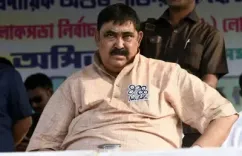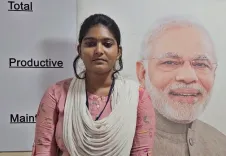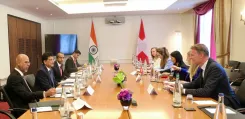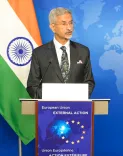Confrontation in Rajya Sabha Over Exclusion of Dissent Notes in Waqf JPC Report
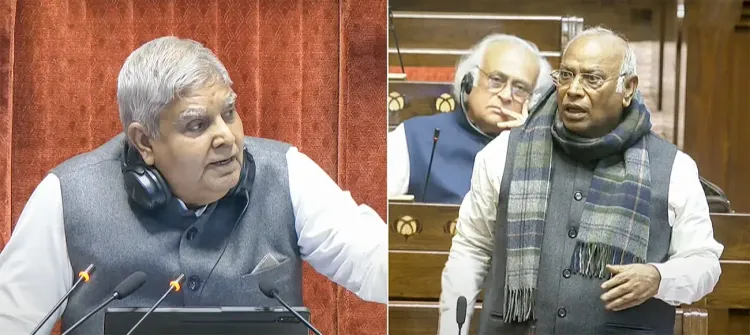
Synopsis
The Joint Parliamentary Committee's (JPC) report on the Waqf (Amendment) Bill has sparked intense conflict in the Rajya Sabha, with opposition members alleging the exclusion of dissent notes, prompting strong reactions from leaders on both sides.
Key Takeaways
- JPC Report sparked significant unrest in the Rajya Sabha.
- Opposition accused the government of deleting dissent notes.
- Kharge labeled the report anti-constitutional.
- Rijiju defended the report's integrity.
- Finance Minister accused the Opposition of misleading the House.
New Delhi, Feb 13 (NationPress) The report from the Joint Parliamentary Committee (JPC) regarding the Waqf (Amendment) Bill has triggered a new contention between the Treasury and Opposition benches in the Rajya Sabha on Thursday, marking the conclusion of the first half of the Budget Session.
Disorder erupted in the Rajya Sabha as soon as the JPC Waqf report was presented in the House.
Members of the Opposition raised an uproar, engaging in sloganeering against the government's alleged high-handedness, asserting that their dissent notes concerning the Bill had been eliminated from the report.
The loud protests from the Opposition also drew the ire of House Chairman Jagdeep Dhankhar, who initially requested them to uphold decorum and subsequently issued a strict warning against the chaos while he conveyed the President’s message.
The JPC report was presented by BJP member Medha Vishram Kulkarni, a member of the panel.
Importantly, the committee provided its report and observations on the proposed amendments to the Waqf Bill to Lok Sabha Speaker Om Birla on January 30.
Numerous protesting lawmakers from the Opposition claimed that dissent notes from JPC members, specifically the Opposition MPs, were erased and accused the government of stifling their perspectives and dissent in an arbitrary manner.
Mallikarjun Kharge, the Leader of the Opposition in Rajya Sabha, insisted that the JPC report be retracted unless it includes dissent notes from the Opposition MPs.
He labeled the JPC report as anti-constitutional and anti-democratic, demanding that dissenting opinions be incorporated into the JPC report.
“Numerous members submitted their dissent notes. It’s unfair to remove these notes and disregard our opinions. This action is anti-democratic. I strongly denounce this report,” the Congress MP stated in the House.
“You possess the authority to reject the report,” Kharge urged the Vice-President.
However, Kharge’s direct accusations were dismissed by Parliamentary Affairs Minister Kiren Rijiju, who asserted that there was no validity to the claims as the dissent notes were included in the report’s appendix.
“These are false allegations. There is no truth in them. No rules have been violated,” Rijiju stated, also urging the Opposition MPs not to mislead the House.
Rijiju’s defense, however, did not persuade the Opposition, as they continued to shout slogans while raising alarms about the integrity of the report and its potential to undermine the Waqf Boards.
Finance Minister Nirmala Sitharaman also entered the fray, accusing the Opposition of misleading the House. She reprimanded the Opposition MPs for creating a persistent disturbance and hindering the House's proceedings by sowing confusion.
Earlier in the day, BJP MP and JPC Chairman Jagdambika Pal informed reporters that the committee had submitted its report after six months of nationwide discussions with various stakeholders and experts on the matter.
The JPC Chairman had presented the report to LS Speaker Om Birla on January 31. The committee had approved the draft legislation with a 15-11 majority vote.
Even during extensive deliberations in JPC meetings, ruling and Opposition MPs clashed.
BJP members backed the amendments, claiming that the forthcoming reforms would enhance transparency and accountability in the management of Waqf Boards, while the Opposition vehemently opposed the initiative.
They characterized the Bill as an assault on minority rights and an unwarranted interference in the operations of Waqf Boards.

